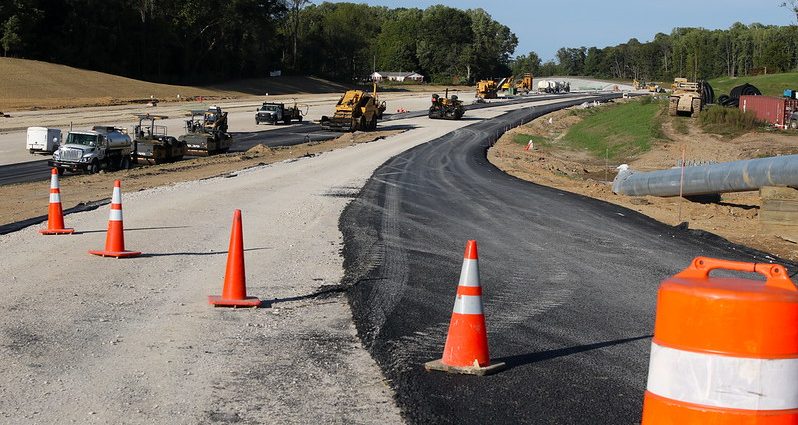A poison pill buried within the new debt ceiling deal would "gut" key elements of the nation's bedrock environmental law in exchange for preventing a national default and could make it easier for highway-building agencies to expedite road projects that harm vulnerable communities for generations, advocates warn.
After tense negotiations with GOP lawmakers, a sprawling bill that would authorize the treasury to raise the debt limit in time to prevent a catastrophic June 5 default. Known in Washington as the Fiscal Responsibility Act of 2023, it includes a set of provisions that opponents say have "nothing to do" with the country's ability to pay its creditors, but would have everything to do with enshrining car dependency on American roads, in addition to a significant cutbacks to public assistance programs, student loan repayments, and the IRS.
Among the most egregious of those provisions is a clause that would revise the language of the National Environmental Protection Act to weaken required assessments of the environmental impacts of federally funded projects like highways and oil pipelines, including impacts on the natural environment — think air, water, wildlife — and crucial features of the human environment, like affordable housing, the civil rights of nearby residents, and more.
NEPA changes in the debt limit deal could make it easier to greenlight more fossil fuel and poorly-regulated mining projects while preventing communities from fighting back. Here’s what’s at stake. https://t.co/kww37RqXiu
— Earthjustice (@Earthjustice) June 1, 2023
Proponents of the move claim it would speed the construction of clean energy and and transit initiatives, too, but advocates slammed that rhetoric as an effort to greenwash a shift that would remove some of the last shreds of red tape placed on autocentric road projects, which currently receive roughly 82 percent of federal transportation funding with few restrictions on how to spend it.
“Gutting the National Environmental Protection Act and other protections not only puts our air, water, and climate at risk but also the health and safety of our families," a coalition of environmental groups wrote in an open letter last month. "Are the marginal gains you’ll see from this assault on environmental laws worth the price of throwing front line communities under the bus Is reducing your paperwork worth losing the public’s support?"
At the heart of the controversy is a section of the bill that draws heavily from the Building U.S. Infrastructure through Limited Delays & Efficient Reviews Act introduced by Rep. Garret Graves (R-La.), which advocates say was built on the long-standing GOP belief that environmental review laws are stifling American growth and causing government spending to balloon. In a February letter, though, a separate coalition of environmental advocates slammed this theory as "thoroughly debunked by administrations of both parties through numerous studies," blaming "lack of project funding, changes in project design, and other factors" instead — and called the BUILDER Act "an extreme attack on government accountability, meaningful public input, and review" with "potential catastrophic consequences."
This is an all-hands-on-deck moment for our people & planet! NEPA is under threat and the Mountain Valley Pipeline could be fast-tracked as early as TODAY.
— Greenpeace USA (@greenpeaceusa) May 31, 2023
Call your reps at 1-888-817-5602 and tell them you want a clean debt ceiling deal! #NoDirtyDeal #StopMVP #CleanDebtCeiling pic.twitter.com/P4FvSAGj7j
Much of the language from that problematic legislation was softened by the time it made its way into the debt ceiling bill, but the sections on the National Environmental Protection Act in the Fiscal Responsibility Act still make subtle rhetorical shifts that could set the stage for massive legal battles over how the bill is interpreted. For instance, instead of requiring governments to report on "any adverse environmental effects which cannot be avoided should the proposal be implemented," the amended NEPA would require them only to report on "reasonably foreseeable environmental effects of the proposed agency action" (emphasis ours), opening the door for a messy debate about how far into the future agencies would be required to look — and whether even the long-term effects of climate change itself would count.
Kevin DeGood of the Center for American Progress even wondered on Twitter whether "state DOTs might never have to produce an Environmental Impact Statement ever again."
With the Fiscal Responsibility Act past the House and poised for a likely Senate vote as soon as Friday, many advocates aren't optimistic that its NEPA provisions will be amended, especially with a likely recession and millions of poor Americans' benefits at stake if the bill doesn't become law and the U.S. defaults. If it does, though, advocates say Congress will essentially be leaving it up Council on Environmental Quality to craft implementing regulations to mitigate its potential damage — and with billions of federal infrastructure dollars flowing to U.S. communities, the CEQ will need to act fast.
"While this deal avoids the consequences of default, our climate is still in crisis and the most overburdened communities will continue paying the highest cost ... This is not the framework we need as we embark on one of the most ambitious periods of infrastructure development in our nation’s history," wrote Raúl García, vice president of policy and legislation for Earth Justice.






